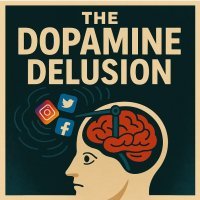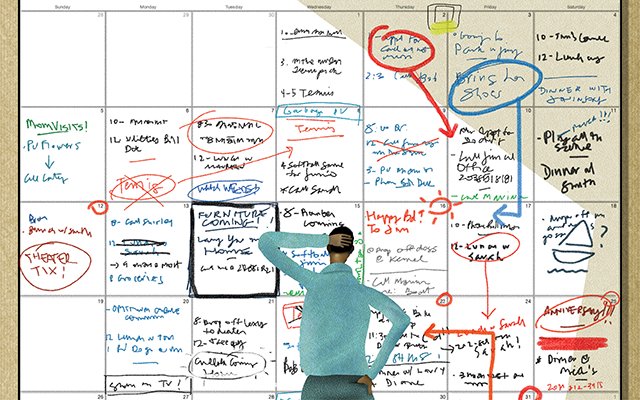Getting Things Done
Your Mind Is For Having Ideas, Not Holding Them
A process for increasing your own productivity and for bringing order and action to your chaotic and random personal world
Introduction to Getting Things Done
“Getting Things Done” is a personal productivity methodology based on storing, tracking, and retrieving the information related to the things that you need to get done.
The getting things done system of processes was created by productivity consultant David Allen who wrote and marketed a book of the same name in 2001.
If you don't use some of personal system of dealing with the mass of things that you need to deal with you will soon accumulate a mass of unresolved "things to do" and all of the attendant stress and hassle that goes with that.
Why Aren't You Getting Things Done?
[1] You have no process in place for getting things done
The human brain likes shortcuts [heuristics] which are predefined processes for how to handle situations as they arise.
You use these shortcuts all the time. Every action that you take is a predefined process that you have either been taught or that you have worked out for yourself. Making a cup of coffee, using your laptop or smartphone, opening a door, greeting someone, the list is endless and encompasses every area of life.
You do all these things automatically. But in each case it starts with a structured learning process, often referred to as the conscious competence learning
model, where having recognised that you have a problem and lack a
particular skill you seek training or instruction, practise it and
master it until it becomes something that you do automatically - an
unconscious competence - it becomes a habit.
If you don't have a process for dealing with stuff as it occurs and lands on your desk, in-box, "to do list", it accumulates and consciously or unconsciously you worry about. It occupies space in your brain and burns mental energy and can cause mental blocks.
OK I know that for many people this is a very real problem, but if you take a step back and think about this - can you imagine NOT having processes in place for doing and dealing with all the everyday things that you do?
Can you imagine walking over to the coffee machine and having to figure out how to make yourself a coffee every single time?
Can you imagine NOT knowing how to greet people and say hello or engage in social conversation?
Can you imagine having to try and figure this out every single time you meet someone?
Obviously life would be extremely difficult and unpleasant and you would feel overwhelmed and experience all sorts of mental blocks and eventually experience mental and emotional health problems.
Well this is precisely what happens to you every single day that you do not have a process in place for getting things done.
By the way, and just to be clear, I have no personal axe to grind on the "Getting Things Done" process. It is one of a large number of time management and personal productivity tools and I am featuring it here because it is popular and features heavily in online searches.
The key thing is that you have some process in place for getting things done.
[2] You waste so much time and energy thinking about and worrying about not getting things done.
The stress on not dealing with stuff as it arises can cause a form of brain fog, and mental blocks can arise which in turn lead to procrastination, which in turn causes you to waste more mental energy worrying about the brain fog, mental blocks and procrastination...
The stress and hassle of not getting things done vastly outweighs the effort of putting some form of system and process for dealing with "stuff" as it arises.
And yet, despite knowing this, so many people continue to muddle along in a cloud of miasmic, mind numbing, mental fog. Why? Short answer: resistance to personal change.
As always with situations of personal change, until the desire to want to change - and learn and implement a process for getting things done - heavily outweighs your resistance to change, the dominant inertia will continue to prevail.
[3] Without a reminder system external to your brain you will forget and stress it further
A key part of any effective system for getting things done is to get all it out of your head and keep it that way.
In addition to the front end process of sorting, categorising, and processing stuff, it is equally important to have a reliable external reminder system.
This way your mind can be present and entirely engaged with the task in hand, and it will not be continually stressed by every input.
Getting Things Done - The Fundamentals
Five clear steps that apply order to chaos:
1. CAPTURE - Collect what has your attention - write, record, or gather any and everything that has your attention into a collection tool.
It’s hard to prioritise until you have taken stock of everything you have to do. So, in this first step, you’ll brain-dump all of your current obligations onto paper, a Google Doc or whatever platform you feel comfortable using.
The absolute rule is get everything out of your head, as David Allen says: “your head is a crappy office.”
2. CLARIFY - Process what it means . Is it actionable? If so, decide the next action and project (if more than one action is required). If not, decide if it is trash, reference, or something to put on hold.
Clarify everything you have to do.
What is the outcome? Is there a next actionable step?
If there isn't one then you need to do one of three things:
- Trash it.
- Store it in a someday/maybe list.
- File it for reference when needed.
If there’s an action to take, then what is it?
If the action will take less than two minutes, do it.
If it will take more than two minutes then add it to your “Waiting On” list.
Or you can defer it, scheduling it on your calendar to do at a specific time with specific next action steps to make getting the work started easier.
3. ORGANIZE - Put it where it belongs. Park reminders of your categorized content in appropriate places.
“Being organized means simply that where something is matches what it means to you.”
Organize your actionable items, and park them based on their category
and priority.
Don’t actually get started doing anything on your list. Just organize in this stage.
4. REFLECT - Review frequently
Next, reflect your to do list, and decide what your next action should be.
In step two, you clarified what your next actions on each item should be; therefore, you should easily be able to pick an action you have the time and energy to do.
5. REVIEW - Update and review all pertinent system contents to regain control and focus.
Finally, your "to-do" items are organized by priority and stored in categories, and you’ve decided which next action you have the time and energy for right now.
This means you are now at the stage for getting things done!
Getting Things Done - Resources
Touch Points With Related Articles
- The One Thing - the power of focused attention
- Time-Boxing Attention - The pomodoro technique
- The Power Of Focus - your point of focus
- Deep Work - the power of applied concentration
- Making Better Decisions - improved decision making
- The Power Of Habits - compounding the efficiency of habits
- Immunity To Change - deal with your resistance
Return to: How To Think
LATEST ARTICLES
The Dopamine Delusion - Why Anticipation Beats Achievement
 The thrill we feel is not in the having, but in the wanting. The more we have, the more we want. The more things we acquire and the easier things get for us, the more discontent we feel. The more spo…
The thrill we feel is not in the having, but in the wanting. The more we have, the more we want. The more things we acquire and the easier things get for us, the more discontent we feel. The more spo…The Power Of Silence Is Experienced In Your Use Of Language
 Practise the "Beneficial Neurological Delay" for optimal comprehension. The power of silence is experienced in your use of language, specifically: - How you formulate the words you use to think and in…
Practise the "Beneficial Neurological Delay" for optimal comprehension. The power of silence is experienced in your use of language, specifically: - How you formulate the words you use to think and in…Dealing With Setbacks - 5 Questions To Help You Face Discomfort
 How To Counter The Cognitive Shock Of A Setback. Setbacks challenge your instinctual desire for control and comfort, making it unnatural to respond with calm or acceptance. The reason for these instin…
How To Counter The Cognitive Shock Of A Setback. Setbacks challenge your instinctual desire for control and comfort, making it unnatural to respond with calm or acceptance. The reason for these instin…Why Praxis Is The Key To Living A Successful And Stress Free Life
 Praxis Is The Process Of Taking Informed Action To take informed action you need to be prepared with information, knowledge, education and insight. Informed action is objective action that: - Seeks to…
Praxis Is The Process Of Taking Informed Action To take informed action you need to be prepared with information, knowledge, education and insight. Informed action is objective action that: - Seeks to…The Power Of Working With The Front Line
 How To Exercise Influence Without Authority In Complex Systems I first discovered the power of working with the frontline when I was working as a business troubleshooter on large projects, programmes…
How To Exercise Influence Without Authority In Complex Systems I first discovered the power of working with the frontline when I was working as a business troubleshooter on large projects, programmes…Dealing With Distraction - Learning How To Live With Your "Attention Autopilot"
 Living With Your Attention Autopilot The good news about your Attention Autopilot is that it will keep you safe. It is continuously scanning your immediate environment for threats. The bad news is tha…
Living With Your Attention Autopilot The good news about your Attention Autopilot is that it will keep you safe. It is continuously scanning your immediate environment for threats. The bad news is tha…The Time Of Your Life - Recognising Moments Of Alignment For Action
 How will you recognise your moment of alignment for action? In this article I want to look at our relationship with time and in the context of the two main themes of this site, firstly as a thinking s…
How will you recognise your moment of alignment for action? In this article I want to look at our relationship with time and in the context of the two main themes of this site, firstly as a thinking s…The Metagame Approach to Second Order Thinking - 5 Guiding Principles
 How To Position Yourself For Survival & Success In A Complex Environment We treat life as though it is a complicated system, and our thinking skills and mental models are focused on understanding its…
How To Position Yourself For Survival & Success In A Complex Environment We treat life as though it is a complicated system, and our thinking skills and mental models are focused on understanding its…Outcome Over Optics - Long Game Outcomes Over Short-Term Ego Gains
 The Day I Learned To Focus On Outcome Over Optics I have never forgotten the day I learned to focus on outcomes over optics and figured out a very simple way of saving myself several hundred thousand…
The Day I Learned To Focus On Outcome Over Optics I have never forgotten the day I learned to focus on outcomes over optics and figured out a very simple way of saving myself several hundred thousand…The ETTO Principle - Why Near Enough Can Be Good Enough
 How To Balance the Efficiency-Thoroughness Trade Off The ETTO Principle describes the inherent trade-off between working efficiently and working thoroughly. This trade-off is something that affects…
How To Balance the Efficiency-Thoroughness Trade Off The ETTO Principle describes the inherent trade-off between working efficiently and working thoroughly. This trade-off is something that affects…Master The Art Of Drawing The Bow
 Focus On Process Not Outcome In so many areas of our lives, we focus on the outcome, not the process that we follow to achieve it. In the western world, we are conditioned to pay less attention to how…
Focus On Process Not Outcome In so many areas of our lives, we focus on the outcome, not the process that we follow to achieve it. In the western world, we are conditioned to pay less attention to how…And So This Is Christmas
 There Is No Path To Peace - The Path Is Peace Thich Nhat Hanh, the renowned Vietnamese Zen Buddhist monk, teacher, and peace activist, often spoke about peace as a state of being that begins within on…
There Is No Path To Peace - The Path Is Peace Thich Nhat Hanh, the renowned Vietnamese Zen Buddhist monk, teacher, and peace activist, often spoke about peace as a state of being that begins within on…Curiosity Skilled The Cat - Optimize For Interesting
 Curiosity Fuels Excellence The old adage, “Curiosity killed the cat,” warns of the dangers of venturing too far into the unknown. But what if we reimagine it not as a risk but as a gateway to developi…
Curiosity Fuels Excellence The old adage, “Curiosity killed the cat,” warns of the dangers of venturing too far into the unknown. But what if we reimagine it not as a risk but as a gateway to developi…Let Stillness Speak - Living Within A Complex System
 To let stlllness speak is to learn it's first major lesson: you are not your thoughts. To let stillness speak is about stepping back from the constant chatter of your mind and allowing a deeper, quiet…
To let stlllness speak is to learn it's first major lesson: you are not your thoughts. To let stillness speak is about stepping back from the constant chatter of your mind and allowing a deeper, quiet…Understanding Complex Systems Thinking - It's Not Complicated
 Understanding, and being able to work with, complexity is an important thinking skill.
We are all working with complex systems, and we do so every day. The biggest one is life itself. We automaticall…
Understanding, and being able to work with, complexity is an important thinking skill.
We are all working with complex systems, and we do so every day. The biggest one is life itself. We automaticall…Stay On The Bus - When To Keep On Going
 The Helsinki Bus Station Theory
Have you ever started a new project, initiative or role with a big vision and a determination to make a difference? Initially you were full of enthusiasm and highly mo…
The Helsinki Bus Station Theory
Have you ever started a new project, initiative or role with a big vision and a determination to make a difference? Initially you were full of enthusiasm and highly mo…Zen Thoughts Email Series
 Conversations With A Friend Zen Thoughts is an email series of 50 short messages spread over 3 months. The messages are written in the style of a conversation with a friend who is going through a toug…
Conversations With A Friend Zen Thoughts is an email series of 50 short messages spread over 3 months. The messages are written in the style of a conversation with a friend who is going through a toug…How to Get What You Value by Changing What You Measure
 Give Up Control & Gain Influence To Get What You Want
The metrics we choose to focus on can significantly shape our outcomes, sometimes in ways we don't intend. The challenge is to make sure that you…
Give Up Control & Gain Influence To Get What You Want
The metrics we choose to focus on can significantly shape our outcomes, sometimes in ways we don't intend. The challenge is to make sure that you…How to Become A Master At Overcoming Hard Moments
 "The best in the world are not the best because they win every point. It's because they lose again and again and have learned how to deal with it." This quote from Roger Federer has got a lot of cover…
"The best in the world are not the best because they win every point. It's because they lose again and again and have learned how to deal with it." This quote from Roger Federer has got a lot of cover…Drop The Story - Deal With Your Demons and Transform Your Experience
 Are you living your life from the stories you tell yourself? Learning how to drop the story and deal with that voice in your head can be a game changer. When you can do this you will have a powerful t…
Are you living your life from the stories you tell yourself? Learning how to drop the story and deal with that voice in your head can be a game changer. When you can do this you will have a powerful t…
